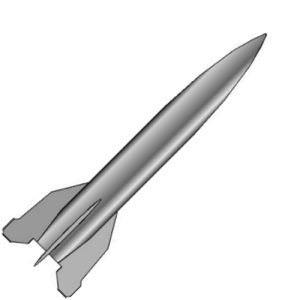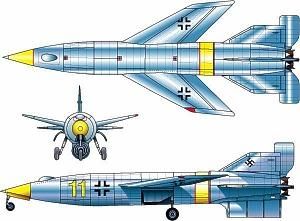
Home - Search - Browse - Alphabetic Index: 0- 1- 2- 3- 4- 5- 6- 7- 8- 9
A- B- C- D- E- F- G- H- I- J- K- L- M- N- O- P- Q- R- S- T- U- V- W- X- Y- Z
A6
 A6 Credit: © Mark Wade |
Status: Design 1943. Thrust: 123.00 kN (27,651 lbf). Height: 15.75 m (51.67 ft). Diameter: 6.33 m (20.76 ft).
The manned A6 was designed to further extend the range of the A4b winged rocket through use of a ramjet for cruise propulsion. The A6 was proposed to the German Air Ministry as an invulnerable photo reconnaissance aircraft (anticipating the SR-71 aircraft by twenty years). The rocket engine would accelerate the vehicle to supersonic speed and an apogee of 95 km. After re-entering the atmosphere and beginning the supersonic glide phase, the ramjet would be ignited. Burning synthetic petrol or coal slurry, it provided fifteen to twenty minutes of cruise at 2,900 km/hr. This would have allowed the aircraft to return to base, unlike the A4b. One pilot was provided with a pressurized cockpit. The reusable A6 would be launched vertically but land on a conventional airfield using landing gear and a drag parachute.
The German Air Ministry had no identified requirement for such an aircraft and the project was rejected. However unmanned variants were considered after the war in both the United States and Soviet Union. These were developed during the course of the 1950's into the awesome intercontinental Mach 3 cruise missiles: the American Navaho in the United States and the Russian Burya / Buran.
Family: IRCM. People: von Braun. Country: Germany. Bibliography: 394, 693, 408.
 | A6 3 View Credit: Gary Webster |
 | A6 3 view Credit: Gary Webster |
Back to top of page
Home - Search - Browse - Alphabetic Index: 0- 1- 2- 3- 4- 5- 6- 7- 8- 9
A- B- C- D- E- F- G- H- I- J- K- L- M- N- O- P- Q- R- S- T- U- V- W- X- Y- Z
© 1997-2019 Mark Wade - Contact
© / Conditions for Use